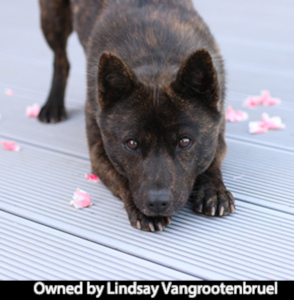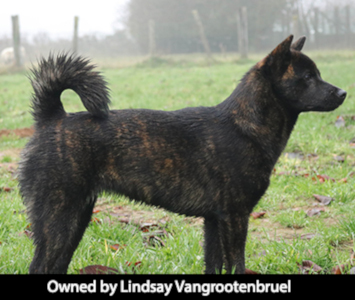


The Kai Ken is one of the smallest members of the medium-sized Nihon Ken breeds. This breed originates from the Yamanashi prefecture of Japan, which was originally known as the Kai province, where the Kai Ken took its name. In 1934, they were recognized as a National Treasure by the Japanese Government, and are very rare in their native Japan.
The Kai was used as a hunting breed for wild boar or deer, as well as a guardian for the home. The breed could originally be split into two types; The shishi-inu-gata, which was a stocky, sturdy dog, and the shika-inu-gata, which was much leaner, and thinner in appearance. Today however, there is no distinction between the two types, and these dogs are mainly kept as pets. This breed is not currently recognised by the UK Kennel Club, but is recognised by the FCI (Fédération Cynologique International).
The Kai Ken falls on the smaller end of the Nihon Ken spectrum, standing anywhere between 16in-21in at the withers. They have a double coat, which sheds regularly and comes in three recognized colours: red brindle, medium brindle, and black brindle. There is a recessive cream gene that some Kai Ken carry, however it is not standard, and is not recognized by any kennel club. They have a curved, or sickle tail, weigh anything between 11kg-17kg and can live up to 15 years of age.

The Kai is an intelligent breed that still retains much of its hunting instinct. They are shy and aloof with strangers or unknown dogs, and can suddenly bolt if spooked. They need regular exercise, and socialization throughout their lives.
The Kai Ken is very attached to their owner and family and will be very receptive to training if the work and dedication is put in. They will remain loyal to their owner and are excellent with children if they are socialized at an early age.
The Kai Ken are a relatively healthy breed, however they have been known to suffer from seizures, PRA (progressive retinal atrophy), allergies, luxating patella, hip and elbow dysplasia, and hemagiosarcoma.
For more information on the Kishu Ken, and in-depth information regarding health issues within the breed, please visit our sister site, the Nihon Ken Network.
If you have photos of your Kai Ken that you would be happy for us to feature here, please send us an email with your photos: info@nihonken.co.uk! Photos need to be of good quality, taken outdoors, preferably without people in them. We would love to feature your dogs!
